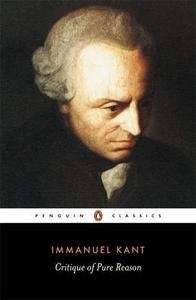Critique of Pure Reason

Editorial Penguin UK
Fecha de edición noviembre 2007
Idioma inglés
EAN 9780140447477
784 páginas
Libro
encuadernado en tapa blanda
Resumen del libro
In the "Critique of Pure Reason", Immanuel Kant laid out a framework upon which the whole of modern philosophy is based. This "Penguin Classics" edition is translated from the German and edited with an introduction by Marcus Weigelt, based on the translation by Max Muller. Kant's "Critique of Pure Reason".
It presents a profound and challenging investigation into the nature of human reason, its knowledge and illusions. Reason, Kant argues, is the seat of certain concepts that precede experience and make it possible, but we are not therefore entitled to draw conclusions about the natural world from these concepts. The Critique brings together the two opposing schools of philosophy: rationalism, which grounds all our knowledge in reason, and empiricism, which traces all our knowledge to experience.
Kant's transcendental idealism indicates a third way that goes far beyond these alternatives. Marcus Weigelt's lucid re-working of Max Muller's classic translation makes the Critique accessible to a new generation of readers. His informative introduction places the work in context and elucidates Kant's main arguments.
This edition also contains a bibliography and explanatory notes. Immanuel Kant (1724-1804), born in Konigsberg, East Prussia, was the most prominent thinker of the German Enlightenment, and one of the most influential philosophers of all time. His comprehensive and profound thinking on aesthetics, ethics and knowledge has had an immense impact on all subsequent philosophy.
Biografía del autor
Immanuel Kant (1724-1804): su obra supone un punto de inflexión en la historia del pensamiento, y la modernidad no ha dejado de autoproclamarse reiteradamente como su heredera. No es extraño, pues, que se decida prestar atención a sus textos en una época como la nuestra, más proclive a hacer balances que a incrementar por sí misma su patrimonio. Ésta puede ser la explicación de que últimamente vengan proliferando tanto las traducciones del filósofo de Königsberg.








